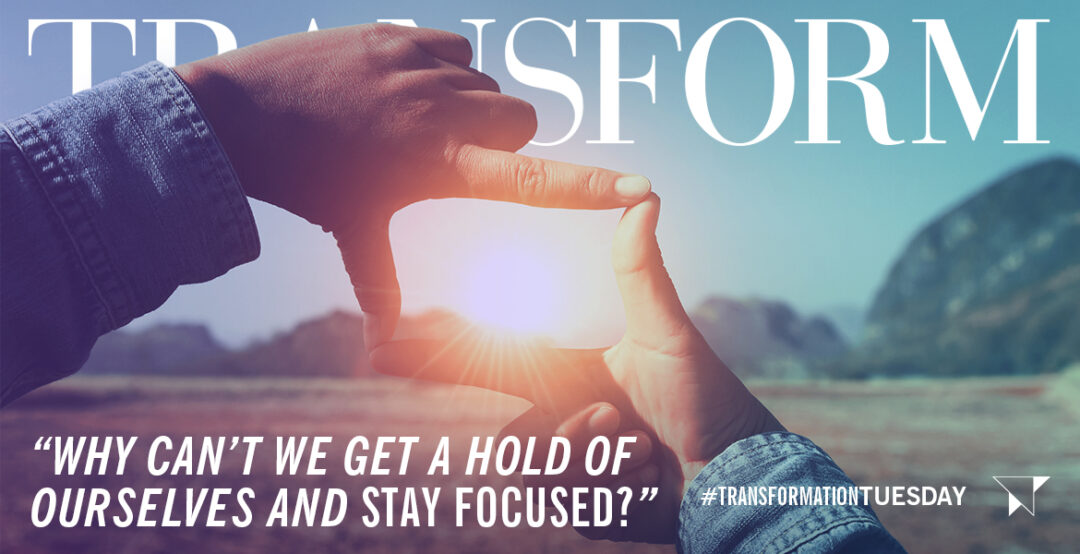One of the biggest challenges for us today is to manage distractions whether in the workplace or at home or driving. We are constantly bombarded with beeps, buzzes, horns, alarms, ringtones, people, etc. and our brain can only handle so many of these stimuli. It goes into overload, and then rather than prioritize where we focus our attention, we often choose the next shiny stimulus that pops us into the immediacy of the moment.
All of us know that focusing our attention on a task or an individual in the moment can help us feel more productive and more connected to others, so the question is, “Why can’t we get a hold of ourselves and stay focused?”
Well, the answer lies in how our brains work. You may have heard Mary Anne or me say in a training or coaching session, “Energy follows attention.” Throughout the day, our attention gets pulled in so many directions. Some things go right by us, some we give one or two seconds of attention, and then there are those that grab our attention and we are hooked. Knowing what hooks our attention can be our first step toward greater self-awareness and increased focus of attention.
In my earlier years of learning that I was a Type 9 on the Enneagram, I discovered that what hooked my attention was any situation or individual interaction where I perceived the existence of a potential or real conflict. The flip side of this was that my attention would get hooked on how to avoid conflict in any and all circumstances. Once I thought or felt that there was actual or perceived conflict –or that I needed to avoid the possibility of there being any, I could spend hours and days furiously working to minimize it.
Looking back, it was exhausting – I lost sleep, I put an exorbitant amount of time and energy into thinking how to fix a situation, and I was always so worried about the “other” that I often forgot or put aside my own tasks and relationships. In the end, the conflict might just happen anyway, and it rarely was as bad as I had imagined in my head. With increased self-awareness, I have been able to catch myself sooner when I get hooked and make a decision about where I will put my attention.
If you want to take control of your attention and get more done, here are some steps I’d recommend:
1. Discover the habitual nature of your attention. The Enneagram is a great tool to help you do this. We first have to have an awareness of our habitual attentional patterns – what hooks us in particular – before we can do anything about them. Take this short quiz to see what your attentional pattern might be.
2. Increase your capacity to be more self-aware in the moment. The second step is to begin to increase you level of self-awareness, that is, catching yourself in the moment and realizing, sooner rather than later, that you have been hooked. What are your cues that you have lost your attention to a task or are procrastinating?
3. Notice where your energy is being channeled and do a 3-Centers practice to unhook or to quickly decide if you will engage your energy, time and effort with what has hooked you. I often do this practice when I am feeling scattered and my attention is not focused on what I need to get done or when I notice I am procrastinating.
-
- Check in with your head: What are you thinking about? Where is your attention right now? Are your thoughts about the past (what you could/should have done?) or about the future (what you need, want, have to do?) Notice the presence of worry, judgments, assumptions, or comparisons. These can get you into trouble!
- Check in with your heart: What’s going on in your heart? What feelings or emotions are active or are you not wanting to let in? How are these feelings/emotions impacting you right now?
- Check in with your body: What is going on in your body? Is your body tense, achy, energized, tired, etc.? Do a quick scan of your body. Check in with your gut. Take a few minutes to listen to what, in this moment, is going on for you.
4. Determine what is “most important” and put your energy there. Once aligned, you can turn your attention to what is most important.
If you are struggling with too many options, do a quick 3-Centers check-in to prioritize what needs to get done. What are all the things pulling on my attention? (Head) What relationships/connections am I concerned about and is this impacting my ability to stay focused right now? (Heart) What does my gut tell me is the next thing I need to work on? (Body)
While I just used a lot of words to describe how to refocus your attention, when you get good at recognizing that your attention is hooked or not focused on what you need to get done, you can do these 4 steps in literally less than an minute –and then you are back on track!
As always, we’re here to help if you need a coaching moment to get refocused.
Theresa Gale
PRINCIPAL, TRANSFORM, INC.




